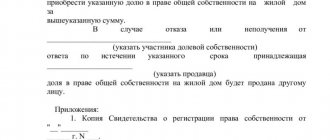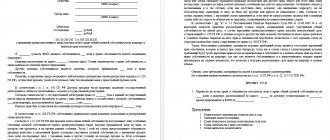Apartment
4
It is not uncommon for more than one person to own a residential property. And each of them has legal rights to their part of the share. However, in addition to rights, there are also a number of obligations that they must be aware of and strictly observe. This will help avoid disputes and conflicts when making transactions with your share of property. All rights and obligations of owners are enshrined in the Civil Code of the Russian Federation.
Shared ownership arises as a result of privatization, inheritance and other situations when there is more than one owner of a particular real estate property.
Property may include:
- to the divisible, when it is not difficult to determine and isolate the shares;
- to indivisible, more often in the case of inherited property, and also when this is technically impossible or not legally permitted.
What is a share in an apartment?
A share in the ownership of an apartment arises when one apartment has several owners. Shared ownership can arise as a result of privatization, transfer of an apartment by inheritance, purchase of an apartment by spouses as shared ownership, and for other reasons. Thus, there are many apartments that are in shared ownership. And on the real estate market you can find many advertisements for the sale of such shares. In cases where the owners of the apartment could not agree on the purchase of a share or on the joint sale of the apartment, the owner has the right to put his share up for sale.
Common property: concept and types
Community ownership arises when property is owned by two or more people and cannot be divided without changing its use. A typical example is an apartment. The type of ownership of it is established during registration, which is reflected in the documents. Owners can be both adults and minors. Common property comes in two varieties - joint and shared.
Joint ownership - when a specific share in the right is not determined. All apartment owners have equal rights and make decisions together. This situation is possible, for example, when spouses buy real estate. By default, everything acquired during marriage is considered joint property. This state of affairs can be changed with a prenuptial agreement.
Shared is a type of ownership when the right to real estate has a quantitative or territorial expression. The owners' shares may be equal or unequal. For example, an apartment belongs to five people in equal shares - each 1/5. There are also such options - one spouse has 2/3, the second - 1/3.
Joint ownership can be converted into shared ownership by agreement of the owners or through the court.
Video: differences between individual, joint and shared ownership
The legislative framework
Here are the basic rules that regulate the right of common ownership of an apartment:
- Chapter 16 of the Civil Code (Civil Code of the Russian Federation). It establishes the procedure for determining property rights, possible options and methods for resolving conflicts.
- Section II of the Housing Code (LC RF). It is dedicated to the rights of ownership and use of an apartment, transactions and registration.
- Art. 42 218-FZ dated July 13, 2015 “On state registration of real estate.” The rules for registering common property are defined here.
- Family Code (RF IC). It considers the property rights and responsibilities of family members. In particular, the rights of spouses - chapters 7 - 9, the rights of children - art. 60.
- Resolution of the Plenum of the Supreme Court of the Russian Federation No. 6, Plenum of the Supreme Arbitration Court of the Russian Federation No. 8 of 01.07.1996. The practice of cases related to shared ownership is summarized here. The document provides recommendations to lower courts for resolving controversial situations.
What is a room as a real estate object?
Article 16 of the Housing Code of the Russian Federation establishes that a room is one of the types of residential premises. According to paragraph 4 of the same article, a room is recognized as a part of a residential building or apartment intended for use as a place of residence for citizens in a residential building or apartment.
The concept of ownership of a share in an apartment is not equivalent to the concept of ownership of a room. Even if the number of shared owners of one apartment is equal to the number of rooms in this apartment.
Ownership of a room arises, as a rule, as a result of the privatization of this room. And the privatization of a separate room is possible only in cases where previously a separate room in a communal apartment was provided under social tenancy agreements or on other rental conditions, if the owner of this room (state, municipality or department) allowed the residents to privatize it.
The difference between a room and a share in an apartment
Ownership of a room differs from a share of ownership of an apartment in that a room is an individual piece of real estate. A room in a communal apartment has a number. And by purchasing such a room in the property, the seller can be sure that this particular room is at his disposal.
In the case of acquiring a share in the ownership of an apartment, the buyer receives only the so-called ideal share. And he does not have an advantage over other shared owners in the use of any particular room in the apartment in which he acquired a share.
At the same time, in advertisements for sale you can often find: a room for sale. This is a relatively budget option, and therefore it is attractive to many.
However, it is necessary to take into account: the room can only be sold in a communal apartment. In some places, communal apartments have been preserved in old buildings. So, in Moscow, for example, there are very few of them left. Communal apartments in Moscow cease to exist due to their active resettlement (during the demolition of dilapidated housing or during the improvement of living conditions for residents), and the creation of new communal apartments, although not formally prohibited, is rare in practice.
When the ad states that a room is for sale, but based on the location and type of the house it is clear that the house is new, the question arises: why are there so many communal apartments in Moscow?
The answer is simple: in fact, it is not a room that is being sold, but a share in the apartment. But counting on the innocence of the buyer, the seller is silent about this.
Why does the seller “disguise” the share as a room? Because owning a room is more profitable than having a share in the ownership of an apartment. And the seller is trying to make his property more attractive.
A room is an isolated living space, and its owner has full rights: to use this room at his own discretion, without asking the consent of neighbors (other homeowners in this apartment); You can register residents in it as members of your family, you can lock it with a key and not let anyone in.
The owner of a share in the right to apartments has completely different rights (and restrictions) . First of all, the owner of the share does not have the right to preferential use of any part of the premises in the apartment. What does this mean?
For example, an apartment has 2 rooms and two owners. And each of them has the right to use both rooms. And he does not have the right to close one room from the second owner of the apartment - unless they agree on this voluntarily.
The owner of the share can only, with the consent of all other owners, register other people in the apartment (with the exception of his minor children) and even bring guests, make repairs and arrange furniture. Any actions regarding the use of the apartment are possible only if agreement is reached between all owners.
The owner of the share cannot rent out his share to other residents at all, since the subject of rent can only be an isolated residential premises. But a share in an apartment is not such a premises. Renting is possible only with the consent of the remaining shared owners, and such rental may be more “conceptual” rather than legally formalized, since the rental agreement must indicate the specific premises that are transferred for use to the tenant, and in the case of shared ownership of an apartment, rooms in it is not equated to shares.
That is why selling rooms is a more profitable option than selling a share in an apartment, and unscrupulous sellers try to attract a buyer with the word “room”.
Deception is easy to spot.
The title documents for the room will indicate: type of residential premises/type of property: room No. such and such in the apartment at the address.
And in the documents for the share, the property will be an apartment, and they will also indicate the share in the right, for example ½. And, having bought such a share, the new owner, roughly speaking, will not take a step in the apartment without the consent of the other owner.
Refusal of share during privatization
A participant can refuse a share both before privatization and subsequently. In the first case, the citizen writes a statement of refusal, which is attached to the package of documents for privatization.
If the shareholder wishes to refuse in the future, then he can exercise his right by drawing up a gift agreement. The procedure is possible only upon receipt of the written consent of the donee. If the shareholder who wishes to renounce his share at the time of drawing up the deed of gift is married, then a written refusal of the spouse will be additionally required. The procedure includes notarization of the deed of gift, payment of the state duty and registration in Rosreestr.
Allocation of shares in kind - a myth when selling a share
Sometimes in an advertisement for the sale of a share you can find the following phrase: “shares are divided in kind.” This is another clever move that the seller of a share in the right to an apartment can use to increase the attractiveness of the share being sold. The goal is to increase the purchase price and try to convince the potential buyer that this is not a share in the right, but an independent property.
However, you need to know: in an apartment, allocating shares in kind is almost impossible. Or rather, it is feasible if it is technically possible to arrange a separate entrance to each part of the apartment, separate bathrooms, a separate gas supply for the kitchen, drainage and sewerage for each of the apartments. One of the rare examples of a positive solution to the issue of dividing an apartment in kind is the Cassation ruling of the Krasnodar Regional Court dated September 20, 2011. in case No. 33-21635/11.
The allocation of shares in kind terminates the right of shared ownership of the apartment, and as a result of such a division, two independent real estate objects are formed.⠀
But in practice, behind the words “shares allocated in kind” lies the fact that the shared owners may have a defined procedure for using the apartment.⠀
Shareholders could determine such an order both voluntarily and in court - if it was not possible to resolve this issue peacefully. And in this case - by agreement or according to a court decision, one of the owners, for example, uses a room with his family, which has a larger area, and the other owner, whose family is smaller, uses a room with a smaller area.
It would seem that the problem of determining which room will go to the new owner has been solved. But no. The procedure for using an apartment between shared owners is not preserved when a share is sold. After all, this order is determined based on specific circumstances. And if the new owner has a smaller family or no family, then the second owner may demand in court that the procedure for using living quarters in the apartment be reviewed.
Therefore, having bought a share in the right to an apartment, the new owner will still have to agree with the other owner which room he should stay in and whether it is possible to make repairs there.
These circumstances must be taken into account when buying or selling shares in an apartment. And, having found an advertisement for “room for sale,” for example, in Moscow in a new residential complex, you immediately understand that no rooms are for sale there. This announcement means the sale of a share.
Rights of share owners
Legislatively, the rights of owners to a shared apartment are enshrined in Article 209 of the Civil Code. Let us list them and focus on individual issues.
Each owner of an apartment in common ownership has the right to:
- own property belonging to him by right of ownership;
- dispose, including carry out transactions for sale, exchange or rental;
- exploit your property.
However, only its sole owner can fully and solely dispose of his property without approval. Common ownership implies several participants whose rights cannot be violated. Therefore, the listed actions can only be performed with the consent of the remaining owners. A negative decision by one of them will lead to the fact that actions regarding common property will be considered unlawful.
It is often easier to find a compromise than to resolve the case in court. But it is not always possible to maintain normal relationships; conflicts here are frequent and sometimes difficult to resolve.
If the rights of any of the owners are violated, he can go to court, which will help resolve the situation. At the same time, his legal right to demand a part of the property equal to his share, to provide ownership for disposal and operation. In the absence of such an opportunity, he may demand a monetary payment from the remaining owners of the common property in an amount proportional to the value of his share.
If shares of property are allocated in kind, then the owner of his part of the apartment can fully dispose of it without coordinating his actions with other shared owners. But they have a pre-emptive right to repurchase if the share is sold.
Renting out common property brings in some income. It must be distributed among the apartment owners in equal shares.
When the share is still equal to the room
Some regions have their own enforcement practices, which may differ. So, for example, everything described above is completely relevant for Moscow. Namely, the fact that the share in the apartment is not equal to the room.
But, for example, in St. Petersburg, rooms in a communal apartment were initially transferred to the ownership of residents during privatization precisely as shares in the ownership of this communal apartment.
It would seem like a paradox, since the Housing Code of the Russian Federation is the same for all regions of Russia.
But, nevertheless, such a situation has arisen, and this has led to a number of differences in the practice of applying housing law in the two Russian capitals.
For example, in Moscow, the owner of a room in a communal apartment has the right to rent out his room to residents without asking the consent of other owners of rooms in this apartment. This right of the owner of a room in Moscow has been repeatedly confirmed by established judicial practice.
And in St. Petersburg, on the contrary, judicial practice follows the path of refusing the owner of a room in a communal apartment to rent out his room without the consent of other room owners. And, since in the northern capital a room in a communal apartment is documented as a share in the ownership of an apartment, this is logical: after all, the owner of the share has the right to move in residents only with the consent of other shared owners.
This difference in law enforcement practice must be taken into account, since in such a huge country as Russia, judicial practice may differ depending on the region.
The right to common property in a communal apartment
The owner of a room in a communal apartment has full rights in relation to the room belonging to him.
However, in a communal apartment there are also common areas, which are common property owned by all owners of the rooms, in shares.
Shares in the right to common property in a communal apartment are not equal
According to Article 42 of the Housing Code of the Russian Federation, the share in the right of common ownership of common property in a communal apartment of the owner of a room is proportional to the size of the total area of the room belonging to him.
But the owner has the right to alienate his share in the ownership of common property in a communal apartment only together with the room. That is, the shared owner does not have the right to sell, for example, part of the kitchen or corridor. The right of shared ownership of common property in a communal apartment will be transferred to the new owner only upon the sale of the room and only together with the right to this room. These restrictions are provided for in paragraphs 3-5 of Article 42 of the Housing Code of the Russian Federation.









